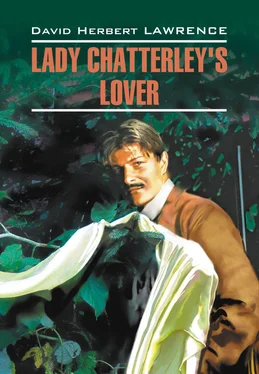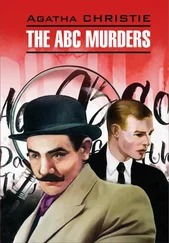“I don’t think I can stand that young man,” said Clifford at lunch.
“Why?” asked Connie.
“He’s such a bounder underneath his veneer…just waiting to bounce us.”
“I think people have been so unkind to him,” said Connie. “Do you wonder? And do you think he employs his shining hours doing deeds of kindness?”
“I think he has a certain sort of generosity.”
“Towards whom?”
“I don’t quite know.”
“Naturally you don’t. I’m afraid you mistake unscrupulousness for generosity.”
Connie paused. Did she? It was just possible. Yet the unscrupulousness of Michaelis had a certain fascination for her. He went whole lengths where Clifford only crept a few timid paces. In his way he had conquered the world, which was what Clifford wanted to do. Ways and means…? Were those of Michaelis more despicable than those of Clifford? Was the way the poor outsider had shoved and bounced himself forward in person, and by the back doors, any worse than Clifford’s way of advertising himself into prominence? The bitch-goddess, Success, was trailed by thousands of gasping dogs with lolling tongues. The one that got her first was the real dog among dogs, if you go by success! So Michaelis could keep his tail up.
The queer thing was, he didn’t. He came back towards tea-time with a large handful of violets and lilies, and the same hang-dog expression. Connie wondered sometimes if it were a sort of mask to disarm opposition, because it was almost too fixed. Was he really such a sad dog?
His sad-dog sort of extinguished self persisted all the evening, though through it Clifford felt the inner effrontery. Connie didn’t feel it, perhaps because it was not directed against women; only against men, and their presumptions and assumptions. That indestructible, inward effrontery in the meagre fellow was what made men so down on Michaelis. His very presence was an affront to a man of society, cloak it as he might in an assumed good manner.
Connie was in love with him, but she managed to sit with her embroidery and let the men talk, and not give herself away. As for Michaelis, he was perfect; exactly the same melancholic, attentive, aloof young fellow of the previous evening, millions of degrees remote from his hosts, but laconically playing up to them to the required amount, and never coming forth to them for a moment. Connie felt he must have forgotten the morning. He had not forgotten. But he knew where he was…in the same old place outside, where the born outsiders are. He didn’t take the love-making altogether personally. He knew it would not change him from an ownerless dog, whom everybody begrudges its golden collar, into a comfortable society dog.
The final fact being that at the very bottom of his soul he was an outsider, and anti-social, and he accepted the fact inwardly, no matter how Bond-Streety he was on the outside. His isolation was a necessity to him; just as the appearance of conformity and mixing-in with the smart people was also a necessity.
But occasional love, as a comfort and soothing, was also a good thing, and he was not ungrateful. On the contrary, he was burningly, poignantly grateful for a piece of natural, spontaneous kindness: almost to tears. Beneath his pale, immobile, disillusioned face, his child’s soul was sobbing with gratitude to the woman, and burning to come to her again; just as his outcast soul was knowing he would keep really clear of her.
He found an opportunity to say to her, as they were lighting the candles in the hall:
“May I come?”
“I’ll come to you,” she said.
“Oh, good!”
He waited for her a long time…but she came.
He was the trembling excited sort of lover, whose crisis soon came, and was finished. There was something curiously childlike and defenceless about his naked body: as children are naked. His defences were all in his wits and cunning, his very instincts of cunning, and when these were in abeyance he seemed doubly naked and like a child, of unfinished, tender flesh, and somehow struggling helplessly.
He roused in the woman a wild sort of compassion and yearning, and a wild, craving physical desire. The physical desire he did not satisfy in her; he was always come and finished so quickly, then shrinking down on her breast, and recovering somewhat his effrontery while she lay dazed, disappointed, lost.
But then she soon learnt to hold him, to keep him there inside her when his crisis was over. And there he was generous and curiously potent; he stayed firm inside her, giving to her, while she was active…wildly, passionately active, coming to her own crisis. And as he felt the frenzy of her achieving her own orgasmic satisfaction from his hard, erect passivity, he had a curious sense of pride and satisfaction.
“Ah, how good!” she whispered tremulously, and she became quite still, clinging to him. And he lay there in his own isolation, but somehow proud.
He stayed that time only the three days, and to Clifford was exactly the same as on the first evening; to Connie also. There was no breaking down his external man.
He wrote to Connie with the same plaintive melancholy note as ever, sometimes witty, and touched with a queer, sexless affection. A kind of hopeless affection he seemed to feel for her, and the essential remoteness remained the same. He was hopeless at the very core of him, and he wanted to be hopeless. He rather hated hope. “Une immense espérance a traversé la terre” [23] “Une immense espérance a traversé la terre” – (фр.) Большие ожидания окутывают землю.
, he read somewhere, and his comment was: “– and it’s darned-well drowned everything worth having.”
Connie never really understood him, but, in her way, she loved him. And all the time she felt the reflection of his hopelessness in her. She couldn’t quite, quite love in hopelessness. And he, being hopeless, couldn’t ever quite love at all.
So they went on for quite a time, writing, and meeting occasionally in London. She still wanted the physical, sexual thrill she could get with him by her own activity, his little orgasm being over. And he still wanted to give it her. Which was enough to keep them connected.
And enough to give her a subtle sort of self-assurance, something blind and a little arrogant. It was an almost mechanical confidence in her own powers, and went with a great cheerfulness.
She was terrifically cheerful at Wragby. And she used all her aroused cheerfulness and satisfaction to stimulate Clifford, so that he wrote his best at this time, and was almost happy in his strange blind way. He really reaped the fruits of the sensual satisfaction she got out of Michaelis’ male passivity erect inside her. But of course he never knew it, and if he had, he wouldn’t have said thank you!
Yet when those days of her grand joyful cheerfulness and stimulus were gone, quite gone, and she was depressed and irritable, how Clifford longed for them again! Perhaps if he’d known he might even have wished to get her and Michaelis together again.
Connie always had a foreboding of the hopelessness of her affair with Mick, as people called him. Yet other men seemed to mean nothing to her. She was attached to Clifford. He wanted a good deal of her life and she gave it to him. But she wanted a good deal from the life of a man, and this Clifford did not give her; could not. There were occasional spasms of Michaelis. But, as she knew by foreboding, that would come to an end. Mick couldn’t keep anything up. It was part of his very being that he must break off any connexion, and be loose, isolated, absolutely lone dog again. It was his major necessity, even though he always said: She turned me down!
The world is supposed to be full of possibilities, but they narrow down to pretty few in most personal experience. There’s lots of good fish in the sea…maybe…but the vast masses seem to be mackerel or herring, and if you’re not mackerel or herring yourself you are likely to find very few good fish in the sea.
Читать дальше












